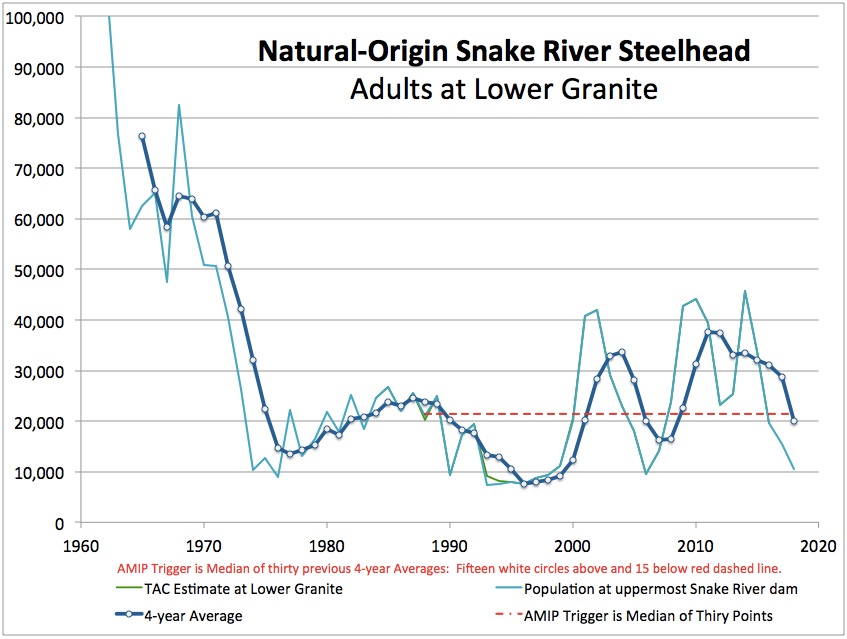forum
library
tutorial
contact

Oregon Lowers Steelhead
Bag Limits on Snake
by Staff
Lewiston Tribune, September 10, 2021
|
the film forum library tutorial contact |

|
Oregon Lowers Steelhead
by Staff
|
 Oregon lowers steelhead bag limits on Snake
Oregon lowers steelhead bag limits on Snake
The Oregon Department of Fish and Wildlife lowered steelhead bag limits this week on the Snake River.
The agency will allow anglers to harvest only one hatchery steelhead per day from the Oregon Washington state line to Hells Canyon Dam. The bag limit matches those put in place by Idaho and Washington.
All three states lowered bag limits in the Snake River upstream of Lower Granite Dam as part of a suite of actions designed to protect the record-low return of steelhead to the Columbia River Basin. Through Wednesday, 46,847 steelhead had been counted passing Bonneville Dam on the Columbia River. That is about 31 percent of the 10-year average of 148,697 and the lowest number recorded since the dam was completed in 1938.
At Lower Granite Dam on the Snake River, 1,928 steelhead have been counted since July 1. That is 19 percent of the 10-year average
According to a news release from the agency, fisheries managers from all three states are only expecting about 10,000 hatchery steelhead to pass Lower Granite Dam, and some hatcheries may struggle to meet spawning goals. The 10-year average for hatchery steelhead passage at Lower Granite is about 70,000 fish.
"The intent of reducing the bag limit to one fish per day is to ensure enough hatchery fish return to the trap at Hells Canyon Dam so we can meet production objectives," said Kyle Bratcher, a fish biologist for the Oregon Department of Fish and Wildlife at Enterprise.
"While we expect to narrowly meet broodstock collection goals, reducing the bag limit will allow us some breathing room if we come up short of our projections."
Chinook return numbers are on track to surpass forecast
Fisheries managers in Idaho are hopeful the fall chinook run will exceed preseason forecasts.
Early counts at Bonneville Dam on the Columbia River indicate the run is on pace to exceed the forecast of 24,500, according to a news release from the Idaho Department of Fish and Game.
Some fall chinook are intercepted at Lower Granite Dam and then trucked to hatcheries and held there for spawning. According to the news release, trapping has gone well, and the rate of fall chinook intercepted at the dam and removed from the river was lowered last week from about 70 percent to 18 percent.
IDFG warning: Watch your dogs; wolf trapping seasons are open
The Idaho Department of Fish and Game is reminding dog owners that many wolf trapping seasons are open in the state and that it has education material on its website showing how to remove a dog from traps and snares.
According to a news release from the agency, most traps and snares are simple in design and easy to operate if you know what to do. Videos and a brochure on recognizing traps and how to release your pet if it gets caught are available at idfg.idaho.gov/trap.
While traps and snares are rarely encountered by bird hunters, many areas have overlapping trapping and upland game bird hunting seasons. A list of when and where trapping is allowed can be found at bit.ly/3jWAfRg.
The agency advises trappers to avoid conflicts with pets by closely following all rules and regulations, including not setting traps close to popular trails, trailheads or areas people frequent. Trappers are also encouraged to post warning signs near their trap lines.
learn more on topics covered in the film
see the video
read the script
learn the songs
discussion forum
